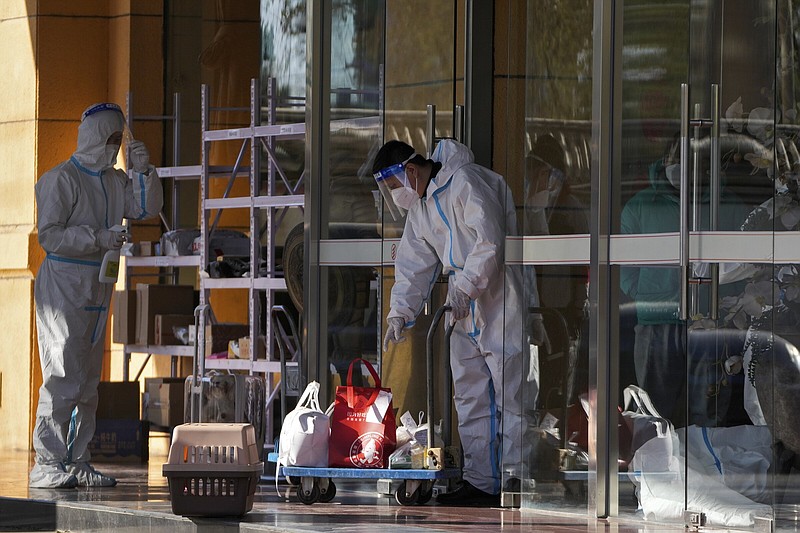BEIJING -- China's ruling Communist Party has vowed to "resolutely crack down on infiltration and sabotage activities by hostile forces," after the largest street demonstrations in decades by citizens fed up with strict anti-virus restrictions. A heavy show of force by the security services Wednesday sought to deter further protests.
The statement from the Central Political and Legal Affairs Commission released late Tuesday came after protests that broke out over the weekend in Beijing, Shanghai, Guangzhou and several other cities.
While it did not directly address the protests, the statement was a reminder of the party's determination to enforce its rule.
Hundreds of SUVs, vans and armored vehicles with flashing lights were parked on city streets while police and paramilitary forces conducted random ID checks and searched people's mobile phones for photos, banned apps or other potential evidence that they had taken part in the demonstrations.
The number of people detained at the demonstrations and in follow-up police actions is not known.
While reports and video of the protests flourished online before being scrubbed by government censors, they have been ignored entirely by the strictly controlled state media.
The commission's statement, issued after an expanded session Monday presided over by its head Chen Wenqing, a member of the party's 24-member Politburo, said the meeting aimed to review the outcomes of October's 20th party congress.
At that event, Xi granted himself a third five-year term as secretary general, potentially making him China's leader for life, while stacking key bodies with loyalists and eliminating opposing voices.
"The meeting emphasized that political and legal organs must take effective measures to ... resolutely safeguard national security and social stability," the statement said.
"We must resolutely crack down on infiltration and sabotage activities by hostile forces in accordance with the law, resolutely crack down on illegal and criminal acts that disrupt social order and effectively maintain overall social stability," it said.
Yet, after seemingly ensuring his political future and unrivaled dominance, Xi, who has signaled he favors regime stability above all, is facing his biggest public challenge yet.
He and the party have yet to directly address the unrest, which spread to college campuses and the semi-autonomous southern city of Hong Kong, as well as sparking sympathy protests abroad.
Most protesters focused their ire on the "zero-covid" policy that has placed millions under lockdown and quarantine, limiting their access to food and medicine while ravaging the economy and severely restricting travel. Many mocked the government's ever-changing line of reasoning, as well as claims that "hostile outside foreign forces" were stirring the wave of anger.
Yet bolder voices called for greater freedom and democracy and for Xi, China's most powerful leader in decades, as well as the party he leads, to step down -- speech considered subversive and punishable with long prison terms. Some held up blank pieces of white paper to demonstrate their lack of free speech.
The party had already promised in October to reduce disruptions, but a spike in infections swiftly prompted party cadres under intense pressure to tighten controls in an effort to prevent outbreaks. The National Health Commission on Wednesday reported 37,612 cases detected over the previous 24 hours, while the death toll remained unchanged at 5,233.
Beijing's Tsinghua University, where students protested over the weekend, and other schools in the capital and the southern province of Guangdong sent students home in an apparent attempt to defuse tensions. Chinese leaders are wary of universities, which have been hotbeds of activism including the Tiananmen protests.
Police appeared to be trying to keep their crackdown out of sight, possibly to avoid encouraging others by drawing attention to the scale of the protests. Videos and posts on Chinese social media about protests were deleted by the party's vast online censorship apparatus.
